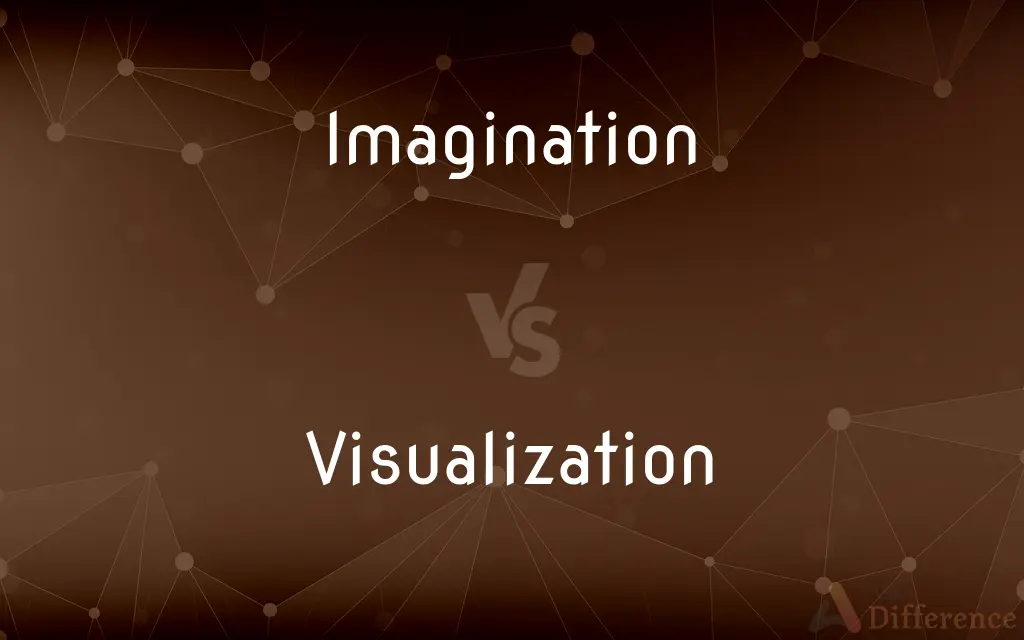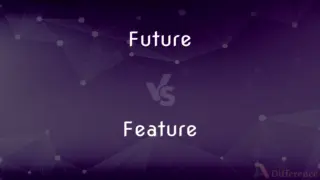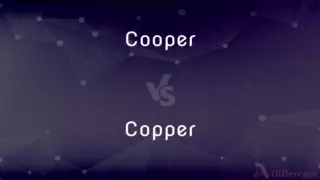Imagination vs. Visualization — What's the Difference?
By Tayyaba Rehman & Urooj Arif — Updated on April 1, 2024
Imagination is the ability to create ideas or pictures in your mind, whereas visualization focuses on creating mental images of specific goals or outcomes.

Difference Between Imagination and Visualization
Table of Contents
ADVERTISEMENT
Key Differences
Imagination is the faculty of the mind to form new ideas, images, or concepts of external objects not present to the senses. It allows for the creation of a vast array of mental scenarios, extending from realistic to fantastical, without any immediate input from the environment. On the other hand, visualization is a more focused use of the imagination, where the mind specifically conjures up images related to achieving a particular goal or outcome. It is often used in goal setting, problem-solving, and enhancing performance by creating clear mental pictures of desired results.
While imagination covers a broad spectrum of mental creativity, visualization serves as a tool within that spectrum, aimed at harnessing imagination for specific, often practical purposes. Imagination can wander freely, creating worlds, stories, or concepts with no bounds. Conversely, visualization tends to be more deliberate, employing the imagination to see a specific event unfold, solve a problem, or achieve a goal, making it a powerful technique in fields such as sports, therapy, and personal development.
Imagination is intrinsic to the human experience, providing the foundation for innovation, art, literature, and scientific discovery. It enables individuals to explore beyond the constraints of their current reality, leading to new inventions, artistic creations, and theoretical propositions. Visualization, while utilizing this innate capability, applies it towards enhancing personal abilities, achieving success, and manifesting personal desires. Athletes, for instance, use visualization techniques to improve their performance by mentally rehearsing their sport, focusing on the success of each action.
The development of imagination and visualization skills can significantly impact one’s ability to innovate, solve problems, and achieve goals. Imagination encourages divergent thinking, the ability to come up with multiple solutions to a problem or generate novel ideas. Visualization, by focusing this imaginative power, helps in creating a clear path to achieving those ideas, making them feel more attainable and real. It bridges the gap between abstract imagination and tangible achievement.
Despite their differences, both imagination and visualization are interconnected and essential for cognitive growth and emotional well-being. Imagination allows for the exploration of the self and the universe in a boundless manner, fostering creativity and empathy. Visualization, as a focused application of imagination, enables individuals to direct these explorations towards achieving specific, personal objectives, thereby facilitating personal growth and the realization of one’s potential.
ADVERTISEMENT
Comparison Chart
Definition
The ability to create ideas, images, or concepts not present to the senses.
The process of creating mental images of specific goals or outcomes.
Scope
Broad and unrestricted.
Focused and goal-oriented.
Purpose
Fosters creativity, innovation, and exploration.
Aims at enhancing performance, solving problems, and achieving goals.
Application
Art, literature, scientific discovery.
Personal development, sports, therapy.
Outcome
Generates new ideas and concepts.
Creates a clear mental picture of a desired result.
Compare with Definitions
Imagination
The faculty of inventing mental images or concepts not present.
His imagination filled the dark forest with mythical creatures.
Visualization
The practice of picturing a desired future to motivate action.
Visualization of his goals kept him focused on his studies.
Imagination
A mental escape into fantastical worlds or scenarios.
Through her imagination, she traveled to places she'd never been.
Visualization
The technique of creating a mental image to achieve a goal.
She used visualization to prepare for her presentation.
Imagination
The source of artistic inspiration and creativity.
The painter's imagination brought the canvas to vivid life.
Visualization
The process of mentally simulating a specific action or outcome.
Athletes use visualization to improve their performance.
Imagination
The process of forming new ideas without immediate sensory input.
His imagination was key to developing the new theory.
Visualization
A focused method for solving problems by imagining solutions.
Visualization helped him overcome the technical challenges.
Imagination
The ability to think creatively and innovatively.
Great inventors use their imagination to envision solutions to problems.
Visualization
Employing mental imagery to enhance relaxation and reduce stress.
Through visualization, she found peace amidst chaos.
Imagination
Imagination is the ability to produce and simulate novel objects, sensations, and ideas in the mind without any immediate input of the senses. It is also described as the forming of experiences in one's mind, which can be re-creations of past experiences such as vivid memories with imagined changes, or they can be completely invented and possibly fantastic scenes.
Visualization
The act or process of visualizing.
Imagination
The faculty or action of forming new ideas, or images or concepts of external objects not present to the senses
Her story captured the public's imagination
She'd never been blessed with a vivid imagination
Visualization
The use of mental images to influence bodily processes, control pain, or prepare for athletic or other kinds of performance.
Imagination
The ability to form mental images of things that are not present to the senses or not considered to be real
The author uses her imagination to create a universe parallel to our own.
Visualization
The act of visualizing, or something visualized.
Imagination
The formation of such images
A child's imagination of monsters.
Visualization
(computing) A visual representation of data.
Imagination
One of these mental images
"some secret sense ... which ... took to itself and treasured up ... her thoughts, her imaginations, her desires" (Virginia Woolf).
Visualization
A mental image that is similar to a visual perception
Imagination
The mind viewed as the locus or repository of this ability or these images
"This story had been rattling around in my imagination for years" (Orson Scott Card).
Imagination
The ability to confront and deal with reality by using the creative power of the mind; resourcefulness
Handled the problems with great imagination.
Imagination
Attention, interest, or enthusiasm
An explorer's ordeal that caught the imagination of the public.
Imagination
The image-making power of the mind; the act of mentally creating or reproducing an object not previously perceived; the ability to create such images.
Imagination is one of the most advanced human faculties.
Imagination
Particularly, construction of false images; fantasizing.
You think someone's been following you? That's just your imagination.
Imagination
Creativity; resourcefulness.
His imagination makes him a valuable team member.
Imagination
A mental image formed by the action of the imagination as a faculty; something imagined.
Imagination
The imagine-making power of the mind; the power to create or reproduce ideally an object of sense previously perceived; the power to call up mental imagines.
Our simple apprehension of corporeal objects, if present, is sense; if absent, is imagination.
Imagination is of three kinds: joined with belief of that which is to come; joined with memory of that which is past; and of things present, or as if they were present.
Imagination
The representative power; the power to reconstruct or recombine the materials furnished by direct apprehension; the complex faculty usually termed the plastic or creative power; the fancy.
The imagination of common language - the productive imagination of philosophers - is nothing but the representative process plus the process to which I would give the name of the "comparative."
The power of the mind to decompose its conceptions, and to recombine the elements of them at its pleasure, is called its faculty of imagination.
The business of conception is to present us with an exact transcript of what we have felt or perceived. But we have moreover a power of modifying our conceptions, by combining the parts of different ones together, so as to form new wholes of our creation. I shall employ the word imagination to express this power.
Imagination
The power to recombine the materials furnished by experience or memory, for the accomplishment of an elevated purpose; the power of conceiving and expressing the ideal.
The lunatic, the lover, and the poetAre of imagination all compact . . . The poet's eye, in a fine frenzy rolling,Doth glance from heaven to earth, from earth to heaven,And as imagination bodies forthThe forms of things unknown, the poet's penTurns them to shapes, and gives to airy nothingA local habitation and a name.
Imagination
A mental image formed by the action of the imagination as a faculty; a conception; a notion.
The same power, which we should call fancy if employed on a production of a light nature, would be dignified with the title of imagination if shown on a grander scale.
Imagination
The formation of a mental image of something that is not perceived as real and is not present to the senses;
Popular imagination created a world of demons
Imagination reveals what the world could be
Imagination
The ability to form mental images of things or events;
He could still hear her in his imagination
Imagination
The ability to deal resourcefully with unusual problems;
A man of resource
Common Curiosities
What is the key difference between imagination and visualization?
Imagination is the broad ability to create ideas or images, while visualization is a focused practice of imagining specific outcomes.
Can imagination lead to real-world innovations?
Yes, imagination is the foundation of innovation, allowing individuals to conceptualize new ideas that can be transformed into tangible inventions or solutions.
How does visualization work?
Visualization works by creating clear mental images of a desired outcome, enhancing the ability to achieve that outcome through focused thought.
How do imagination and visualization contribute to problem-solving?
Imagination allows for generating multiple solutions, while visualization helps in focusing on the implementation of a specific solution.
Is visualization only useful in sports?
No, visualization is beneficial in various areas, including personal development, therapy, and education, by helping individuals achieve goals and improve skills.
How do artists use imagination?
Artists use imagination to create unique pieces of art, inventing new forms and expressions that reflect their vision and emotional state.
Can visualization affect emotional well-being?
Yes, visualization can positively impact emotional well-being by reducing stress, increasing confidence, and fostering a positive outlook.
Can visualization help in overcoming fears and anxieties?
Yes, by visualizing positive outcomes and coping strategies, individuals can reduce fears and anxieties associated with various situations.
Can everyone visualize effectively?
While visualization comes naturally to some, it is a skill that can be developed with practice and training.
What is the importance of imagination in education?
Imagination is crucial in education, as it fosters creativity, critical thinking, and the ability to envision complex concepts and solutions.
What role does visualization play in personal growth?
Visualization is a powerful tool for personal growth, helping individuals to see themselves achieving their goals, thereby motivating action towards those goals.
Are there any scientific studies supporting the benefits of visualization?
Yes, numerous studies have shown that visualization can improve performance, enhance motivation, and reduce stress and anxiety.
How does imagination influence culture and society?
Imagination drives cultural evolution by inspiring art, literature, and innovations that reflect and shape societal values and progress.
How can one improve their imagination?
Engaging in creative activities, reading, and exposing oneself to new experiences can help enhance imagination.
Is visualization considered a form of meditation?
Visualization can be part of meditation practices, especially those focused on achieving relaxation, clarity, or specific personal objectives.
Share Your Discovery

Previous Comparison
Future vs. Feature
Next Comparison
Cooper vs. CopperAuthor Spotlight
Written by
Tayyaba RehmanTayyaba Rehman is a distinguished writer, currently serving as a primary contributor to askdifference.com. As a researcher in semantics and etymology, Tayyaba's passion for the complexity of languages and their distinctions has found a perfect home on the platform. Tayyaba delves into the intricacies of language, distinguishing between commonly confused words and phrases, thereby providing clarity for readers worldwide.
Co-written by
Urooj ArifUrooj is a skilled content writer at Ask Difference, known for her exceptional ability to simplify complex topics into engaging and informative content. With a passion for research and a flair for clear, concise writing, she consistently delivers articles that resonate with our diverse audience.














































